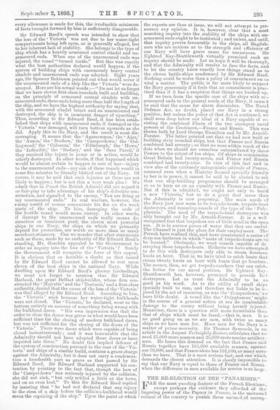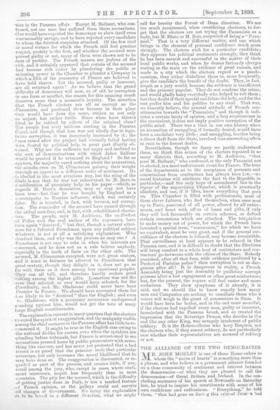THE RE-ELECTION OF THE "PANAISIISTS." F AR the most puzzling feature
of the French Electione, except perhaps the evideece they afforded of thse lingering power of the Papacy in France, is the me/verge refusal of the country to punish these a.ccuscd.of coartnie - -tion in the Panama affair. Except M. Balhaut, who con- fessed, not one man has suffered from those accusations.
• IDae would have expected the democracy to show itself even unreasonably savage, and to have rejected every candidate to whom the faintest suspicion attached. Of the few civil or moral virtues for which the French still feel genuine respect, probity is the first, and whether the accused were proved guilty or not, many of them were shown not to be anen of probity. The French masses are jealous of the ,-rich, and it certainly appeared that certain of the accused had become rich either by plundering the public or 'misusing power in the Chamber to plunder a Company in 'which a fifth of the peasantry of France are believed to have held shares. Yet the accused, guilty or innocent, -are all returned again ! As we believe that the grand difficulty of democracy will now, as of old, be corruption in one form or another, the reason for this amazing result deserves more than a moment's inquiry. The assertion that the French electors are all as corrupt as the sPanamists, and pardoned them because in their place -they would have done the same, strikes us not only -as unjust, but rather futile. Since when have thieves liked to be robbed by others of the criminal class ?
Tao people lost sixty millions sterling in the Panama -C Ina], and though that loss was not wholly due to legis- . ltaive corruption, it was immensely increased by it ; the blus raised after the project had virtually failed having b.-en floated by political help, in great part illicitly ob- t tined. Why are the sufferers not angry and inclined to the sort of demonstrations with which Jabez Balfour would be greeted if he returned to England ? So far as • appears, the majority cared nothing about the accusations, the attacks even on M. 016menceau gaining their weight through an appeal to a different order of sentiment. He libelled in the most atrocious way, but the sting of the -libels is not that he was too subservient to M. Herz in e msideration of pecuniary help to his paper—which, as regards M. Herz's decoration, may or may not have been true—but that he was bought by England as a • ceunterpoise to Russian influence, which was certainly false. He is taunted, in fact, with treason, not corrup- tion. The remainder of the accused have passed through the ordeal scot-free, and, in fact, with rehabilitated charac- ters. The people, says M. Andrieux, the ex-Prefect of Police and the real author of the exposures, have -been again " deceived ; " but that, though a natural utter- ance for a defeated Frenchman upon any political subject whatever, is not at all a satisfying explanation. Who • deceived them, and why was the process an easy one ? A Frenchman is not easy to take in when his interests are esncerned, and ho does not as a rule believe anybody, 'especially in the teeth of facts on the other side. The accused, M. Chlmenceau excepted, were not great orators, and it must in fairness be allowed to Frenchmen that great oratory, though they delight in it, does not go so far with them as it does among less emotional peoples. 'They can all talk, and therefore hardly reckon good ,talking among the higher gifts. L tinartine was not the man they selected, or ever would have selected, for the Presidency, and Mr. Gladstone could never have been Premier in France. We should have accounted them far less likely to be "deceived" than the English ; and even sti . Gladstone, with a pecuniary accusation undisproved • s'anding against him, would not get the vote of many large English constituencies. The explanation current in many quarters that the electors • re 'ented the spirit of exaggeration, and the malignity visible among the chief accusers in the Panama affair has little to re- '-commend it. It might be true in the English case owing to -the national dislike for excess, even when the speakers are 'pleading before tribunals, but France is accustomed to see 'accusations pressed home by public prosecutors with some- thing like rancour, and has never yet protested that a bad record is no proof that the prisoner stole that particular sovereign, but only increases the moral likelihood that he may have done so. The exaggeration is discounted, or re- -gardecl as part of the process, and creates little, if any, recoil among the jury, who, except in cases where senti- ment intervenes, acquit less frequently than in most countries. The pity for the accused, which is the difficulty of getting justice done in Italy, is not a marked feature -(1 French opinion, or the galleys could not survive all changes of Government. We fancy the explanation As to be found in a different direction, what we might call for brevity the Forest of Dean direction. We are too much accustomed, when considering elections, to for- get that the electors are not trying the Panamists as a body, but M. Blanc or M. Noir, suspected of being a "Pane- mist." That is a very different matter, and one which brings in the element of personal confidence much more strongly. The electors wish for a particular candidate; they approve his political sentiments strongly, they think he has been earnest and successful in the matter of their local public works, and when he denies furiously charges resting in the main on the evidence of great rascals, and made in a city which the electors regard as a pande- monium, they either disbelieve them or, more frequently, give the candidate the benefit of the doubt. They, in fact, acquit as a jury would, because the evidence is insufficient and the prisoner popular. They do not condone the crime, and would gladly hang everybody who helped to rob them ; but they doubt if their special candidate did help, and for the rest prefer him and his politics to any rival. That was, we honestly believe, the general attitude of French con- stituencies towards the "Panamists," and though it indi- cates a certain laxity of opinion, and a lazy acquiescence in the convenient, it does not imply positive corruption of the public mind. There was a time in our own history when an accusation of smuggling, if formally denied, would have hurt a candidate very little ; and smuggling, besides being a direct theft from the State, involved loss amounting often to ruin to the honest dealer.
Nevertheless, though we fancy we partly understand them, we think this action of the electors repeated in so many districts that, according to M. Andrieux, "that poor M. Balhaut," who confessed, is the only Panamist not re-elected, is a most unfortunate event for France. The tone of the departments as to the acceptance of presents and commissions from contractors has always been low,—no social historian will attribute the fact to the epublic in particular,—and the only hope of amendment lies in the rigour of the supervising Chamber, which is practically absolute, and can, if it likes, know everything that goes on. This Chamber is filled with professionals, most of them clever failures, who find themselves, when once sent up to Paris, possessed of all power, allured by all entice- ments, and beset with offers of loans and gifts, if only they will look favourably on certain schemes, or defend certain concessions which are attacked. The temptation to make money out of power, for which the French have invented a special term, "concussion," for which we have no equivalent, must be very great, and if the general sur- veillance of the electors is relaxed, may become irresistible. That surveillance at least appears to be relaxed in the Panama case, and it is difficult to doubt that the Elections will bring comfort to a whole host of contractors and con- tractors' go-betweens with the offices of the State. Nobody punished, after all that fuss, with evidence produced by a Prefect of Parisian police ? then corruption is not so dan- gerous after all ! It is dangerous in reality, a French Assembly being just the Assembly to guillotine corrupt persons after a lost engagement or other great misfortune; but, for the present, the rogues will feel easier and more audacious. They show symptoms of it already, it is said, and we should like to know exactly how many men and Companies are seeking to conciliate those whore voices will weigh in the grant of concessions in Siam. It would have been far better, and in the end more merciful, if the electors had expelled every man, guilty or innocent, besmirched with the Panama brush, and so created the impression that the Sovereign Demos, who decides in tie end like any other King, was savagely intolerant of public robbery. It is the Hohenzollerns who keep Empires, not the electors who, if they resent robbery, do not particularly care whether their representatives are accused of robbery or not.



































 Previous page
Previous page